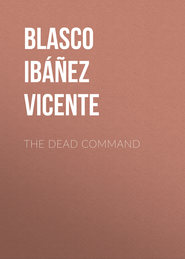По всем вопросам обращайтесь на: info@litportal.ru
(©) 2003-2024.
✖
Woman Triumphant (La Maja Desnuda)
Настройки чтения
Размер шрифта
Высота строк
Поля
López de Sosa was wealthy. His father, a former manufacturer of canned goods, had left him a fortune that he administered prudently, never gambling, nor keeping mistresses (he had no time for such follies) but finding all his amusement in sports that strengthen the body. He had a coach-house of his own, where he kept his carriages and his automobiles which he showed to his friends with the satisfaction of an artist. It was his museum. Besides, he owned several teams of horses, for modern fads did not make him forget his former tastes, and he took as much pride in his past glories as a horseman as he did in his skill as a driver of cars. At rare intervals, on the days of an important bull-fight or when some sensational races were being run in the Hippodrome, he won a triumph on the box by driving six cabs, covered with tassels and bells, that seemed to proclaim the glory and wealth of their owner with their noisy course.
He was proud of his virtuous life; free from foolishness or petty love affairs, wholly devoted to sports and show. His income was less than his expenses. The numerous personnel of his stable-garage, his horses, gasoline and tailors' bills ate up even a part of the principal. But López de Sosa was undisturbed in this ruinous course,—for he was conscious of the danger, in spite of his extravagance. It was a mere youthful folly, he would cut down his expenses when he married. He devoted his evenings to reading, for he could not sleep quietly, unless he went through his classics (sporting-papers, automobile catalogs, etc.), and every month he made new acquisitions abroad, spending thousands of francs and, complaining, like a serious business man, of the rise in the Exchange, of the exorbitant customs charges, of the stupidity of the Government that so shackled the development of the country. The price of every automobile was greatly increased on crossing the frontier. And after that, politicians expected progress and regeneration!
He had been educated by the Jesuits at the University of Deusto and had his degree in law. But that had not made him over-pious. He was liberal, he lived the modern spirit; he had no use for fanaticism nor hypocrisy. He had said good-by to the good Fathers as soon as his own father, who was a great admirer of them, had died. But he still preserved a certain respect for them because they had been his teachers and he knew that they were great scholars. But modern life was different. He read with perfect freedom, he read a great deal; he had in his house a library composed of at least a hundred French novels. He purchased all the volumes that came from Paris with a woman's picture on the cover and in which, under pretext of describing Greek, Roman, or Egyptian customs, the author placed a large number of youths and maidens without any other decorations of civilization than the fillets and the caps that covered their heads.
He insisted on freedom, perfect freedom, but for him, men were divided into two castes, decent people and those who were not. Among the first figured en masse all the young fellows of the Gran Peña, the old men of the Casino, together with some people whose names appeared in the papers, a certain evidence of their merit. The rest was the rabble, despicable and vulgar in the streets of the cities, repulsive and displeasing on the road, whom he insulted with all of the coarseness of ill-breeding and threatened to kill when a child ran in front of his car with the vicious purpose of letting itself be crushed under the wheels, to stir up trouble with a decent person, or when some workingman, pretending he could not hear the warnings of his horn, would not get out of the way and was run over—as if a man who makes two pesetas a day were superior to machines that cost thousands of francs! What could you do with such ignorant, commonplace people! And some wretches were still talking about the rights of man and revolutions!
Cotoner, who expended incredible care in keeping his single suit presentable for calls and dinners, questioned López de Sosa with astonishment in regard to the progress of his wardrobe.
"How many ties have you now, Rafael?"
"About seven hundred." He had counted them recently. And ashamed that he did not yet own the longed-for thousand, he spoke of fitting himself out on his next trip to London when the principal British automobilists were to contend for the cup. He received his boots from Paris, but they were made by a Swiss boot-maker, the same one who provided the foot-gear of Edward of England; he counted his trousers by the dozen, and never wore one pair more than eight or ten times; his linen was given to his valet almost before it was used, his hats all came from London. He had eight frock-coats made every year, that often grew old without ever being worn, of different colors to suit the circumstances and the hours when he must wear them. One in particular, dead black with long skirts, gloomy and austere, copied from the foreign illustrations that represented duels, was his uniform on solemn occasions, which he wore when some friend looked him up at the Peña, to get his assistance in representing him with his customary skill in affairs of honor.
His tailor admired his talent, his masterly command in choosing cloth and deciding on the cut among the countless designs. Result, he spent something like five thousand dollars a year on his clothes, and said ingenuously to the two artists,
"How much less can a decent person spend if he wants to be presentable?"
López de Sosa visited Renovales' house as a friend after the latter had painted his portrait. In spite of his automobiles, his clothes, and the fact that he chose his associates among people who bore noble titles, he could not succeed in getting a foothold in society. He knew that behind his back people nicknamed him, "Pickled Herring," alluding to his father's trade, and that the young ladies, who counted him as a friend, rebelled at the idea of marrying the "Canned-goods Boy," which was another of his names. The friendship of Renovales was a source of pride.
He had requested him to make his portrait, paying him without haggling, in order that he might appear at the Exhibition, quite as good a way as any other of introducing his insignificance among the famous men who were painted by the artist. After that he was on intimate terms with the master, talking everywhere about "his friend, Renovales!" with a sort of familiarity, as if he were a comrade who could not live without him. This raised him greatly in the estimation of his acquaintances. Besides, he had felt a real admiration for the master ever since one afternoon when tired out with the account of his prowess as a fencer, Renovales had laid aside his brushes and taking down two old foils, had had several bouts with him. What a man he was! And how he remembered the points he had learned in Rome!
In his frequent visits to the artist's house, he finally felt attracted toward Milita; he saw in her the woman he wanted to marry. Lacking more sonorous titles, it was something to be the son-in-law of Renovales. Besides, the painter enjoyed the reputation of being wealthy, he spoke of his enormous profits, and he still had many years before him, to add to his fortune, all of which would be his daughter's.
López de Sosa began to pay court to Milita, calling on his great resources, appearing every day in a different suit, coming every afternoon, sometimes in a carriage drawn by a dashing pair, sometimes in one of his cars. The fashionable youth won the favor of her mother,—an important part. This was the kind of a husband for her daughter. No painter! And in vain did Soldevilla put on his brightest ties and show off shocking waistcoats; his rival crushed him and, what was worse, the master's wife, who formerly used to have a sort of motherly concern for him and called him by his first name, for she had known him as a boy, now received him coldly, as if she wished to discourage his suit for Milita.
The girl fluctuated between her two admirers with a mocking smile. One seemed to interest her as much as the other. She drove the painter, the companion of her childhood, to despair, at times abusing him with her jests, at others attracting him with her effusive intimacy, as in the days when they played together; and at the same time she praised López de Sosa's stylishness, laughed with him, and Soldevilla even suspected that they wrote letters to each other as if they were engaged.
Renovales rejoiced at the cleverness with which his daughter kept the two young men uncertain and eager about her. She was a terror, a boy in skirts, more manly than either of her worshipers.
"I know her, Pepe," he said to Cotoner. "We must let her do what she wants to. The day she decides in favor of one or the other we'll have to marry her at once. She isn't one of the girls to wait. If we don't marry her soon and to her taste, she's likely to elope with her fiancé."
The father excused Milita's impatience. Poor girl! Think what she saw in her home! Her mother always ill, terrifying her with her tears, her cries and her nervous attacks; her father working in his studio, and her only companion the unsympathetic "Miss." He owed his thanks to López de Sosa for taking them outdoors on these dizzy rides from which Josephina returned greatly quieted.
Renovales preferred his pupil. He was almost his son, he had fought many a hard battle to give him fellowships and prizes. He was a trifle displeased at some of his slight infidelities, for as soon as he had won some renown, he bragged about his independence, praising everything that the master thought condemnable behind his back. But even so, the idea of his marrying his daughter pleased him; a painter as a son-in-law; his grandchildren painters, the blood of Renovales perpetuated in a dynasty of artists who would fill history with their glory.
"But, oh, Pepe! I'm afraid the girl will choose the other. After all, she's a woman. And women appreciate only what they see, gallantry and youth."
And the master's words betrayed a certain bitterness, as though he were thinking of something very different from what he was saying.
Then he began to discuss the merits of López de Sosa, as if he were already a member of the family.
"A good boy, isn't he, Pepe? A little stupid for us, unable to talk for ten minutes without making us yawn, a fine fellow, but not our kind."
There was scorn in Renovales' voice as he spoke of the vigorous healthy young men of the present, with their brains absolutely free from culture, who had just assaulted life, invading every phase of it. What people! Gymnastics, fencing, kicking a huge bull, swinging a mallet on horseback, wild flights in an automobile; from the royal family down to the last middle-class scion everyone rushed into this life of childish joy, as if a man's mission consisted merely in hardening his muscles, sweating and delighting in the shifting chances of a game. Activity fled from the brain to the extremities of the body. They were strong, but their minds lay fallow, wrapped in a haze of childish credulity. Modern men seemed to stop growing at the age of fourteen; they never went beyond, content with the joys of movement and strength. Many of these big fellows were ignorant of women, or almost so, at the age when in other times they were turning back, satiated with love. Busy running without direction or end, they had no time nor quiet to think about women. Love was about to go on a strike, unable to resist the competition of sports. The young men lived by themselves, finding in athletic exercise a satisfaction that left them without any desire or curiosity for the other pleasures of life. They were big boys with strong fists; they could fight with a bull and yet the approach of a woman filled them with terror. All the sap of their life was used up in violent exercise. Intelligence seemed to have concentrated in their hands, leaving their heads empty. What was going to become of this new people? Perhaps it would form a healthier, stronger human race, but without love or passion, without any other association than the blind impulse of reproduction.
"We are a different sort, eh, Pepe?" said Renovales with a sly wink. "When we were boys we didn't care for our bodies so well, but we had better times. We weren't so pure, but we were interested in something higher than automobiles and prize cups; we had ideals."
Then he began to talk again of the young man who expected to become one of his family and made sport of his mentality.
"If Milita decides on him, I won't object. The important thing in such matters is that they should be congenial to each other. He's a good boy; I could almost give him my blessing. But I suspect that when the sensation of novelty has worn off, he will go back to his fads and poor Milita will be jealous of those machines that are eating up the greater part of his fortune."
Sometimes, before the light died out in the afternoon, Renovales excused his model, if he had one, and laying aside his brushes went out of the studio. When he came back, he would have on his coat and hat.
"Pepe, let's take a walk."
Cotoner knew where this walk would land them.
They followed the iron fence of the Retiro and went down the Calle de Alcalá, walking slowly among the groups of strollers, some of whom turned round behind them to point out the master. "That taller one is Renovales, the painter." In a few minutes, Mariano hastened his step with nervous impatience, he stopped talking and Cotoner followed him with an ill-humored expression, humming between his teeth. When they reached the Cibeles, the old painter knew that their walk was nearly over.
"I'll see you to-morrow, Pepe, I'm going this way. I've got to see the countess."
One day, he did not limit himself to this brief leave-taking. After he had gone a few steps, he came back toward his companion and said hesitatingly:
"Listen, if Josephina asks you where I went, don't say anything. I know that you are prudent but she is always worried. I tell you this so as to avoid any trouble. The two women don't get along together very well. Some woman's quarrel!"
II
At the opening of spring, when Madrid was beginning to think good weather had really come, and people were impatiently getting out their summer clothes, there was an unexpected and treacherous return of winter that clouded the sky and covered with a coat of snow the muddy ground and the gardens where the first flowers of spring were beginning to sprout.
There was a fire once more in the fireplace in the drawing-room of the Countess of Alberca, where all the gentlemen who formed her coterie gathered to keep warm on days when she was "at home," not having a meeting to preside over or calls to make.
When Renovales came one afternoon, he spoke enthusiastically of the view of Moncloa, covered with snow. He had just been there, a beautiful sight, the woods, buried in wintry silence, surprised by the white shroud when they were beginning to crack with the swelling of the sap. It was a pity that the camera craze filled the woods with so many people who went back and forth with their outfits, sullying the purity of the snow.
The countess was as interested as a child. She wanted to see that, she would go the next day. Her friends tried in vain to dissuade her, telling her the weather would probably change presently. To-morrow the sun would come out, the snow would melt; these unexpected storms were characteristic of the fickle climate of Madrid.
"It makes no difference," said Concha obstinately, "I've got the idea into my head. It's years since I have seen it. My life is such a busy one."
She would go to see the thaw in the morning; no, not in the morning. She got up late and had to receive all those Women's Rights ladies that came to consult her. In the afternoon, she would go after luncheon. It was too bad that Renovales worked at that time and could not go with her. He could appreciate landscapes so well with his artist's eyes and had often spoken to her of the sunset from the palace of Moncloa, a sight almost equal to the one you can see in Rome from the Pinzio at dusk. The painter smiled gallantly. He would try to be at Moncloa the next day; they would meet.
The countess seemed to take sudden fright at this promise and glanced at Doctor Monteverde. But she was disappointed in her hope of being censured for her fickleness and unfaithfulness, for the doctor remained indifferent.
Lucky doctor! How Renovales hated him. He was a young man, as fair and as fragile as a porcelain figure, a combination of such striking beauties that his face was almost a caricature. His hair, parted in two waves over his pale forehead, was black, very black and shining with bluish reflections, his eyes, as soft as velvet, showed the read spot of the lachrymal on the polished ivory of the cornea, veritable odalisque eyes, his bright red lips showed under his bristly mustache, his complexion was as pale as a camellia, and his teeth flashed like pearl. Concha looked at him with ecstatic devotion, talked with her eyes on him, consulting him with her glance, lamenting inwardly his lack of mastery, eager to be his slave, to be corrected by him in all the caprices of her giddy character.
Renovales scorned him, questioning his manhood, making the most atrocious comments on him in his rough fashion.
He was a doctor of science and was waiting for a chair at Madrid to be declared vacant, that he might become a candidate for it. The Countess of Alberca had him under her high protection, talking about him enthusiastically to all the important gentlemen who exercised any influence in University circles. She would break out into the most extravagant praise of the doctor in Renovales' presence. He was a scholar and what made her admire him was the fact that all his learning did not keep him from dressing well and being as fair as an angel.
"For pretty teeth, look at Monteverde's," she would say, looking at him in the crowded room, through her lorgnette.
At other times, following the course of her ideas, she would interrupt the conversation, without noticing the irrelevancy of her words.
"But did you notice the doctor's hands? They're more delicate than mine! They look like a woman's hands."
The painter was indignant at these demonstrations of Concha's that often occurred in her husband's presence.
The calm of that honorable gentleman astounded him. Was the man blind? And the count with fatherly good humor always said the same thing.
"That Concha! Did you ever hear such frankness! Don't mind her, Monteverde, it's my wife's way, childishness."















